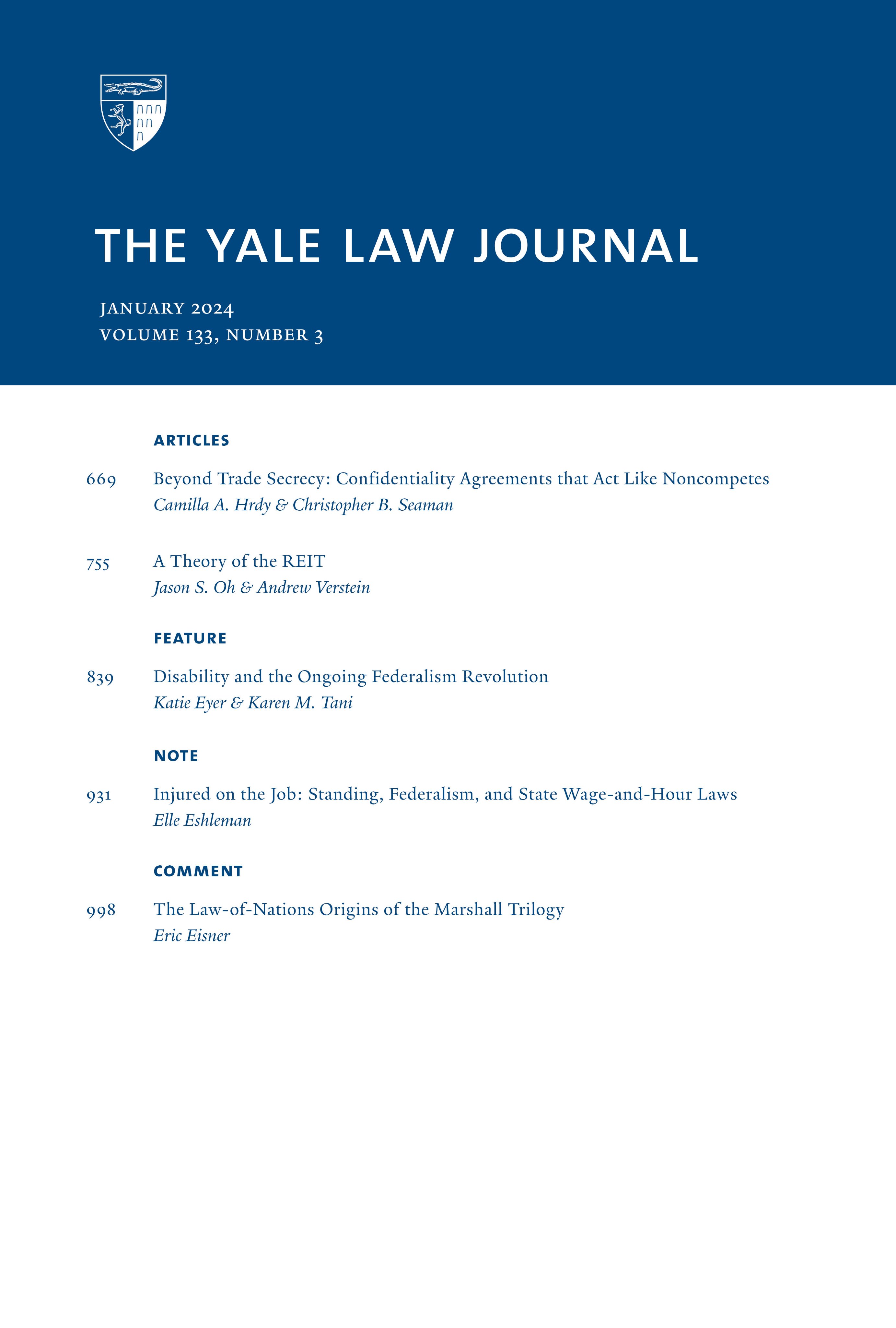不情愿的民族主义者:1801-1829年共和时期的联邦行政和行政法
IF 5.2
1区 社会学
Q1 LAW
引用次数: 11
摘要
1801年,杰斐逊派的共和党人接管了国会、总统职位和国家行政,决心遏制他们的联邦党前任过度的国家建设。在这一努力中,他们取得了部分成功。但是,历史的潮流和国家发展的要求使他们的野心受挫。在恢复民主的同时,他们也建立了行政能力。本文考察了共和时期的行政结构和问责制,试图理解19世纪初的“行政法”。这种调查通过两个扩展的案例研究进行:1807-1809年的杰斐逊禁运和几十年来联邦政府调查和出售不断扩大的“公共领域”的努力。第一个是美国国家政府在之前或之后尝试的最引人注目的商业监管。第二个开始了土地办公室的生意,在近一个世纪的时间里主导了这个国家的政治和法律意识。禁运检验了行政强制的限度,并揭示了管制行政的必要性与普通法形式的司法审查之间不断升级的冲突。公共领域的出售需要在美国建立第一个大规模行政裁决系统,并揭示了在一个意识形态上致力于议会制政府的政体中,国会对行政控制的野心和局限性。这些案例共同描述了19世纪早期对当代行政法中一系列熟悉主题的处理方法:总统与国会对行政的控制,行政裁决的适当性和形式,通过一般规则实施政策,以及司法审查的适当作用。也许最重要的是,禁运事件和使公共领域私有化的努力都表明,内部行政控制和问责制在维持联邦法律适用的中立性和一致性方面具有独特的重要性。这种“行政的内部规律”仍然是美国行政治理的一个重要方面,也是一个未被充分研究的方面。本文章由计算机程序翻译,如有差异,请以英文原文为准。
Reluctant Nationalists: Federal Administration and Administrative Law in the Republican Era, 1801-1829
In 1801 the Jeffersonian Republicans took charge of Congress, the presidency, and the national administration, determined to roll back the state-building excesses of their Federalist predecessors. In this effort they were partially successful. But the tide of history and the demands of a growing nation confounded their ambitions. While reclaiming democracy they also built administrative capacity. This Article examines administrative structure and accountability in the Republican era in an attempt to understand the "administrative law" of the early nineteenth century. That inquiry proceeds through two extended case studies: the Jeffersonian Embargo of 1807-1809 and the multi-decade federal effort to survey and sell the ever-expanding "public domain." The first was the most dramatic regulation of commerce attempted by an American national government either before or since. The second began a land office business that dominated the political and legal consciousness of the nation for nearly a century. The embargo tested the limits of administrative coercion and revealed an escalating conflict between the necessities of regulatory administration and judicial review in common law forms. The sale of the public domain required the creation of the first mass administrative adjudication system in the United States and revealed both the ambitions and the limits of congressional control of administration in a polity ideologically devoted to assembly government. Together these cases describe the early-nineteenth-century approach to a host of familiar topics in contemporary administrative law: presidential versus congressional control of administration, the propriety and forms of administrative adjudication, policy implementation via general rules, and the appropriate role of judicial review. Perhaps most significantly, both the embargo episode and the efforts to privatize the public domain demonstrate the singular importance of internal administrative control and accountability in maintaining neutrality and consistency in the application of federal law. This "internal law of administration" remains both a crucial and an understudied aspect of American administrative governance.
求助全文
通过发布文献求助,成功后即可免费获取论文全文。
去求助
来源期刊

Yale Law Journal
LAW-
CiteScore
4.50
自引率
6.20%
发文量
0
期刊介绍:
The Yale Law Journal Online is the online companion to The Yale Law Journal. It replaces The Pocket Part, which was the first such companion to be published by a leading law review. YLJ Online will continue The Pocket Part"s mission of augmenting the scholarship printed in The Yale Law Journal by providing original Essays, legal commentaries, responses to articles printed in the Journal, podcast and iTunes University recordings of various pieces, and other works by both established and emerging academics and practitioners.
 求助内容:
求助内容: 应助结果提醒方式:
应助结果提醒方式:


